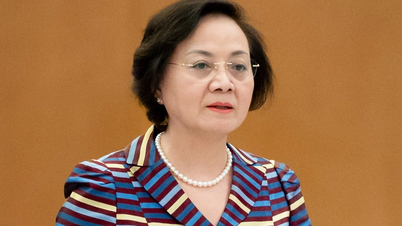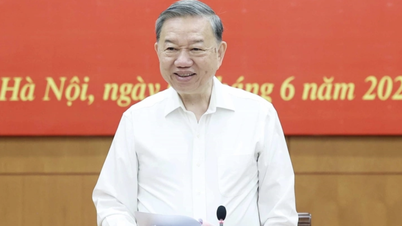 |
| National Assembly Chairman Tran Thanh Man speaks at the 46th session of the National Assembly Standing Committee on the afternoon of June 3, 2025. Photo: Doan Tan/VNA |
Previously, presenting the Government's Report, Minister of Health Dao Hong Lan said that under the leadership of the Party and State, the engagement, active participation, coordination, and efforts to implement population work of all levels, sectors, and the entire political system, the consensus of all classes of people, and international organizations, our country's population work in recent years has achieved important results. Population policies and laws have been gradually improved.
From 2006 to 2021, Vietnam has achieved and maintained the replacement fertility rate nationwide; maintained an appropriate population growth rate; the population size in 2024 will reach more than 100 million people. Vietnam is in the golden population period, creating great advantages for the socio -economic development process; population quality and human development index (HDI) are constantly increasing; the average life expectancy of Vietnamese people is increasingly improved. The above results are an important premise for shifting population policy from family planning to population and development.
The promulgation of the Ordinance aims to create a legal basis for institutionalizing the Party's guidelines, policies and strategies on population work, focusing on the birth rate; regulating the rights and obligations of each couple and individual in having children, ensuring human rights, basic rights of citizens, gender equality in population work, contributing to maintaining a stable replacement birth rate nationwide, overcoming the significant difference in birth rates between regions and subjects.
This draft Ordinance amends Clause 1, Article 1 of the Population Ordinance No. 08/2008/PLUBTVQH12 amending Article 10 of the Population Ordinance 2003: "Decision on time and spacing of births" to "Decision on time of birth, number of children and spacing between births appropriate to the age, health status, conditions of study, labor, work, income and child-rearing of individuals and couples on the basis of equality"; removes Clause 2 "Giving birth to one or two children, except in special cases prescribed by the Government"; retains Clause 3, Article 1 of the Population Ordinance No. 08/2008/PLUBTVQH12 amending Article 10 of the Population Ordinance 2003 to be regulated as Clause 2, Article 1 of the draft Ordinance.
This amendment aims to overcome the fertility gap between regions and groups, and avoid the fertility rate falling too low and not reaching the replacement level - which could negatively affect sustainable economic, social, security and defense development in the future.
The Government's report shows that amending legal documents regulating the number of children is one of the contents aimed at maintaining the replacement fertility rate, avoiding the birth rate from continuing to decrease in the coming time. According to some current studies, the desire to have two children is still popular in society, but not all couples can make it a reality; other factors in life greatly influence people's decision to have children; therefore, after amending this regulation, the birth rate may increase in the short term, but the increase is not significant.
According to the review of the Committee for Culture and Society, the draft Ordinance is consistent with the Party's policies and guidelines. Although only one article (Article 10) of the Population Ordinance is amended, the amended content aims to institutionalize the Party's policies and guidelines in shifting the focus of population policy from family planning to population and development, implementing the goal of adjusting population size in Resolution No. 21 on population work in the new situation, which is "Firmly maintaining the replacement fertility rate (an average of 2.1 children per woman of childbearing age)".
The Committee recommends that the Government ensure resources for implementation, clearly defining the most important role and responsibility of the state population management agency and the funding source provided by the state budget must play a leading role, especially when the birth rate has fallen deeply below the replacement level, making it very difficult to achieve the goal of firmly maintaining the replacement level by 2030.
Chairman of the Committee on Culture and Society, Mr. Nguyen Dac Vinh, said that the Standing Committee of the Committee agreed with the scope of amendment, subjects of application, and structure of the draft Ordinance, and proposed to name the Ordinance "Ordinance amending Article 10 of the Population Ordinance", ensuring brevity, completeness, and consistency with the way the name is expressed similar to the laws, ordinances, and resolutions that have been passed.
The amendment of Article 10 of the Population Ordinance aims to immediately institutionalize the Politburo's directive and to meet practical requirements. It is recommended that the Government report to the National Assembly Standing Committee to decide on the draft Ordinance to be developed and promulgated according to simplified procedures and take effect from the date of approval by the National Assembly Standing Committee.
VNA
Source: https://baodanang.vn/xa-hoi/202506/phien-hop-thu-46-uy-ban-thuong-vu-quoc-hoi-sua-phap-lenh-dan-so-bo-quy-dinh-sinh-mot-hoac-hai-con-4008068/


































































































Comment (0)